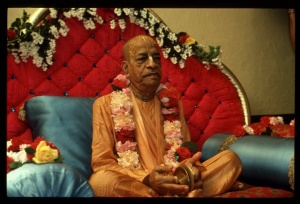SB 10.4.27

A.C. Bhaktivedanta Swami Prabhupada
TEXT 27
śoka-harṣa-bhaya-dveṣa-
lobha-moha-madānvitāḥ
mitho ghnantaṁ na paśyanti
bhāvair bhāvaṁ pṛthag-dṛśaḥ
SYNONYMS
śoka—lamentation; harṣa—jubilation; bhaya—fear; dveṣa—envy; lobha—greed; moha—illusion; mada—madness; anvitāḥ—endowed with; mithaḥ—one another; ghnantam—engaged in killing; na paśyanti—do not see; bhāvaiḥ—because of such differentiation; bhāvam—the situation in relation to the Supreme Lord; pṛthak-dṛśaḥ—persons who see everything as separate from the control of the Lord.
TRANSLATION
Persons with the vision of differentiation are imbued with the material qualities lamentation, jubilation, fear, envy, greed, illusion and madness. They are influenced by the immediate cause, which they are busy counteracting, because they have no knowledge of the remote, supreme cause, the Personality of Godhead.
PURPORT
Kṛṣṇa is the cause of all causes (sarva-kāraṇa-kāraṇam (BS 5.1)), but one who has no connection with Kṛṣṇa is disturbed by immediate causes and cannot restrain his vision of separation or differences. When an expert physician treats a patient, he tries to find the original cause of the disease and is not diverted by the symptoms of that original cause. Similarly, a devotee is never disturbed by reverses in life. Tat te 'nukampāṁ susamīkṣamāṇaḥ (SB 10.14.8). A devotee understands that when he is in distress, this is due to his own past misdeeds, which are now accruing reactions, although by the grace of the Supreme Personality of Godhead these are only very slight. Karmāṇi nirdahati kintu ca bhakti-bhājām (Bs. 5.54). When a devotee under the protection of the Supreme Personality of Godhead is to suffer because of faults in his past deeds, he passes through only a little misery by the grace of the Lord. Although the disease of a devotee is due to mistakes committed sometime in the past, he agrees to suffer and tolerate such miseries, and he depends fully on the Supreme Personality of Godhead. Thus he is never affected by material conditions of lamentation, jubilation, fear and so on. A devotee never sees anything to be unconnected with the Supreme Personality of Godhead. Śrīla Madhvācārya, quoting from the Bhaviṣya Purāṇa, says:
- bhagavad-darśanād yasya
- virodhād darśanaṁ pṛthak
- pṛthag-dṛṣṭiḥ sa vijñeyo
- na tu sad-bheda-darśanaḥ
SB 10.4.28
2008-03-17T12:26:01Z
Acyuta
2

A.C. Bhaktivedanta Swami Prabhupada
TEXT 28
śrī-śuka uvāca
kaṁsa evaṁ prasannābhyāṁ
viśuddhaṁ pratibhāṣitaḥ
devakī-vasudevābhyām
anujñāto 'viśad gṛham
SYNONYMS
śrī-śukaḥ uvāca—Śrī Śukadeva Gosvāmī said; kaṁsaḥ—King Kaṁsa; evam—thus; prasannābhyām—who were very much appeased; viśuddham—in purity; pratibhāṣitaḥ—being answered; devakī-vasudevābhyām—by Devakī and Vasudeva; anujñātaḥ—taking permission; aviśat—entered; gṛham—his own palace.
TRANSLATION
Śukadeva Gosvāmī continued: Thus having been addressed in purity by Devakī and Vasudeva, who were very much appeased, Kaṁsa felt pleased, and with their permission he entered his home.